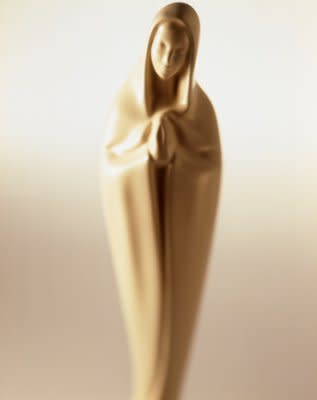The controversy over "virgin" mothers

It's been over 2000 years since the New Testament account of Mary's virgin birth, and over 20 years since Marilyn's virgin birth. In 1990, a British-born nurse named Marilyn Wright found herself in the center of a national debate.
At 40, she gave birth to her son, Jonas, with the help of artificial insemination and an anonymous donor. She had been trying for 8 years, but never with man. " she told the British press. "Ideally, I would have loved a husband and family, but I never met Mr. Right and had to create a family without a man."
In many ways Wright was ahead of her time. There are over 14 million one parent households today and growing number of single women are enlisting fertility treatments to start their families. But few are virgins. "It's not that common nowadays," says Jane Mattes, a psychotherapist and the founder and director of Single Mothers by Choice. "Most of the single women seeking insemination are in their 30's and have been in relationships." But the few who haven't engaged in sexual activity with either gender are wary of the stigma. "I have heard people say they're embarrassed and worried what people will think if they get IVF. Getting inseminated is already controversial, and so is being a 37 year-old virgin in our society," says Mattes. "But most people don't care what a mom's sexual background is as long as she's able to raise a child well."
That wasn't the case for Wright in the early '90s. Dubbed one of a growing group of "Madonna moms" she was chastised by religious groups and British political leaders for engaging in what was then dubbed "original sin with a syringe." (Ironically, Wright credited her devout Christian upbringing for maintaining her virginity.) Artificial insemination at the time was only about 10 years old in England, and its moral and ethical implications caused riotous debate. According to the Washington Post, critics feverishly opposed the issue of virgin births more than any other type of "unconventional" pregnancy because of its connection to religious beliefs. The Anglican Archbishop of York called Wright's virgin pregnancy an "act of defiance" born out of "dangerous selfishness." Parliamentary member Dame Jill Knight had the harshest criticism: "If a woman finds herself unable to have a sexual relationship, she's not, frankly, a rounded individual, and I think the business of bringing up a child calls for a rounded individual."
A year after Wright's son was born, Britain's health secretary, Virginia Bottomley, campaigned to limit the number of virgin births, after a handful of other reported virgins sought IVF treatment through the British Pregnancy Advisory Service. In neighboring France, a bill to outlaw virgin births altogether was circulated in the government.
In many ways, the concerns weren't that different than those being voiced today. Are men becoming obsolete? How does the medical procedure reflect on sacred texts? And what's next, homosexuals raising kids? Thankfully, that was next. After a lesbian couple in Britain fought for custody of their 22-month old child and won, the country's conservative faction nearly blew its top. And all eyes once again turned to Wright, the virgin mother. In 1994, Bottomley launched an investigation into Wright's case and the clinic that provided her care, and urged state-funded clinics to exclusively treat married women for the sake of the child.
Not everyone backed her up. The British Pregnancy Advisory Service defended its non-discriminatory insemination policy, stating "aptitude for and commitment to sustaining loving and respectful relationships" is more important than a conventional male-female parenting partnership.
Twenty years later their statement still holds true. "I think it's wonderful that we've come to a point in society where a woman who is competent and prepared to raise a child alone, has the option to do so," says Mattes. "Whether they're virgins seems extraneous." In this time of counting blessings, it's worth thanking all those moms who fought for their right to raise kids and the people who stood by them when others wouldn't. Isn't that what Christmas is about?
Related on Shine:
